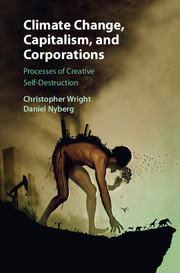Book contents
- Frontmatter
- Dedication
- Contents
- List of figures
- List of tables
- Foreword
- Acknowledgements
- 1 Climate change and corporate capitalism
- 2 Creative self-destruction and the incorporation of critique
- 3 Climate change and the corporate construction of risk
- 4 Corporate political activity and climate coalitions
- 5 Justification, compromise, and corruption
- 6 Climate change, managerial identity, and narrating the self
- 7 Emotions, corporate environmentalism, and climate change
- 8 Political myths and pathways forward
- 9 Imagining alternatives
- Appendix
- References
- Index
2 - Creative self-destruction and the incorporation of critique
Published online by Cambridge University Press: 05 October 2015
- Frontmatter
- Dedication
- Contents
- List of figures
- List of tables
- Foreword
- Acknowledgements
- 1 Climate change and corporate capitalism
- 2 Creative self-destruction and the incorporation of critique
- 3 Climate change and the corporate construction of risk
- 4 Corporate political activity and climate coalitions
- 5 Justification, compromise, and corruption
- 6 Climate change, managerial identity, and narrating the self
- 7 Emotions, corporate environmentalism, and climate change
- 8 Political myths and pathways forward
- 9 Imagining alternatives
- Appendix
- References
- Index
Summary
Anyone who believes exponential growth can go on forever in a finite world is either a madman or an economist.
(Attributed to Kenneth Boulding in United States Government, 1973: 248)In 2006, in a landmark report for the British government, climate change was described as ‘the greatest market failure the world has ever seen’ (Stern et al., 2006: viii). ‘Business as usual’ was not an option, said the authors. Strong, collective action was deemed imperative.
So how was this strong, collective action to be achieved? The answer, said the report, lay in creating opportunities for growth. Policies to support new technologies should be encouraged. ‘Carbon pricing’ and ‘carbon finance’ should be embraced. Every effort should be made to speed the transition to a low-carbon economy. The key message was that the cost of doing nothing would far outweigh the cost of taking action.
At first glance a manifesto such as this seems both well intentioned and, certainly nowadays, all too familiar. But at the same time it also captures the very essence of creative self-destruction: it encapsulates the bizarre notion that the only available response to a problem caused by the market's ever-expanding reach is to expand that reach further still.
This damaging conviction is the central theme of this chapter. We argue that it is the enduring promulgation of such a belief – the insidious spread and entrenchment of the idea that only more consumption can remedy the devastating consequences of over consumption – that allows inventive genius to go hand-in-hand with selective blindness, capitalism to freeride on nature and the environment itself to be rendered nothing more than a commodity. As we will see, it is a question of how corporations paper over the cracks and contradictions in our economy; and it is a question, above all, of the difference between values and value.
The age of creative self-destruction
We are living in a new geological epoch: the Anthropocene (Crutzen, 2002; Steffen et al., 2007). It is an epoch in which fossil fuel exploitation is reshaping the Earth's systems, exceeding the boundaries of what constitutes a ‘safe operating space for humanity’ (Rockström et al., 2009). It is an epoch that demands answers we appear determined not to provide.
- Type
- Chapter
- Information
- Climate Change, Capitalism, and CorporationsProcesses of Creative Self-Destruction, pp. 28 - 46Publisher: Cambridge University PressPrint publication year: 2015
- 1
- Cited by



